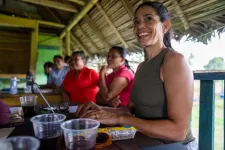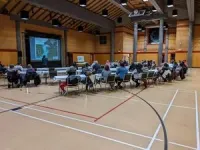(Press-News.org) Slowing down the pace may not be common in academia, but it could lead to better science to support our planet through the current climate, biodiversity and social justice crises. This is one approach suggested by a diverse group of marine conservation scientists who were brought together in 2021 by the COMPASS “Leaders for Sea Change” Science Communication program. In a new paper published in Proceedings of the National Academy of Sciences (PNAS), the co-authors consider three pathways to better connect with the places they study.
Frequently, scientific expertise to address the global change crisis comes from a place of privilege. Research findings often come from the Global South but are disseminated, debated, and championed by well-funded institutions and experts in the Global North. Despite much of the science being conducted in the places most vulnerable to the pressing challenges of our times, the knowledge, histories, and Indigenous wisdom of local communities are often overlooked or undervalued by the scientific community.
The co-authors of the paper “Centering relationships to place for more meaningful research and engagement” argue that this type of knowledge “extractivism” may occur because of time, capacity, funding, or personal constraints. However, they also contend that extractive human behavior toward the natural world and each other is what has led us to our current global crises in the first place. They argue that building relationships to places of study and their people would lead to more fair science and more accurate and meaningful research outcomes, and present three pathways aimed at building deeper connections between natural scientists and the places they study.
The first pathway is to “Deepen reflection and communication about relationships with places”. For example, this pathway can be practiced by immersing oneself in local communities, learning about the historical and social-ecological narratives of the places of study, and allowing these experiences to shift perspectives, refine research goals and expand the societal relevance of research findings. This pathway also encourages expanded land acknowledgements. Researchers are encouraged to seek guidance from local and Indigenous resources to precede public communications with recognition of past and present Indigenous presence in these spaces. An additional suggestion is to expand positionality statements beyond mere disclosure of personal and professional backgrounds to include a broader spectrum of influences shaping the research process, such as the geographic, socioeconomic, institutional, and cultural contexts of the scientists involved, to show where their perspectives come from.
The second pathway is to “Strengthen collaboration amongst research teams and partners”, which entails building a foundation of mutual respect, trust and knowledge exchange between scientists and individuals who may be local or Indigenous to the place of research. Understanding their worldviews and expertise may lead to new ways of thinking about and relating to a place. This pathway encourages collaboration and engagement with partners outside of academia and project co-creation with local partners, a common practice in the social sciences. This could result in research outcomes that are meaningful and transformative to those who may be impacted by research processes, improve public trust in research findings and make knowledge more accessible.
“Change must happen, and this is one way we can contribute toward a cultural shift to make the research process more equitable and relational, as a way to move away from extractive paradigms,” said lead author Fiona Beaty, an early-career scientist from the University of British Columbia.
Recognizing that developing these deeper relationships to place takes time and energy, and that a majority of natural sciences institutions or research systems do not currently incentivize this type of work, co-authors of the PNAS paper propose to “Transform systems of knowledge creation to foster place-based roots” as a third pathway.
They recommend that institutions consider restructuring training, evaluation, and funding systems throughout various career stages. A critical area would be to revise training and research opportunities within both undergraduate and graduate programs. Hiring and evaluation processes could also be transformed to encourage the development of deep relationships with places of study. Finally, funding systems could support collaboration outside of academic systems by incentivizing public research dissemination activities and community engagement alongside traditional metrics of academic success, such as peer-reviewed publications.
“Natural science institutions throughout the world and particularly in the global north could reshape their reward systems, which impacts researchers' lives, promoting place-based and deeply rooted research,” said Beaty. “It’s really hard for individuals to make change if they’re constantly battling the system.”
The authors also propose the development of site-based research capacity, which may look like many things; for example, empowering local scientists to lead research aligned with community needs or creating site-specific centers that employ local experts or collaborate with community organizations to produce knowledge that is tailored to their specific contexts.
“These perspectives are the result of multi-year conversations where we shared experiences amongst one another and recognized the outstanding value of and complications involved in genuine and impactful engagement,” said co-author Katharine Bear Nalven, from Oregon State University.
Beaty hopes this paper inspires early career researchers by giving them a range of options and offering guidance. She also seeks to encourage established researchers to see how they can contribute to change within academia.
“We do not expect everyone to take up all our suggestions, because it can be overwhelming, but different people may have different entry points,” said Beaty.
Ana K. Spalding, co-author and director of the Adrienne Arsht Community-Based Resilience Solutions Initiative at STRI, views this paper as a testament to the effectiveness of training programs such as Leaders for Sea Change.
“Our aspiration is for initiatives like this, focused on capacity building and leadership training, to gain momentum and underscore the significance of collaboration,” she said.
Headquartered in Panama, the Smithsonian Tropical Research Institute is a unit of the Smithsonian Institution in Washington, DC. The institute furthers the understanding of tropical biodiversity and its importance to human welfare, trains students to conduct research in the tropics and promotes conservation by increasing public awareness of the beauty and importance of tropical ecosystems.
END
Centering relationships between people and place: A critical step towards improving science's contributions to society
2024-06-03
ELSE PRESS RELEASES FROM THIS DATE:
Mobile app predicts future depression in pregnant people
2024-06-03
A simple survey delivered during the first trimester through digital pregnancy support app MyHealthyPregnancy predicted which mothers went on to develop moderate to severe depression with a high level of accuracy, according to a new Archives of Women’s Mental Health study led by University of Pittsburgh and UPMC researchers.
“Depression is a leading complication during pregnancy with about 15% of patients reporting symptoms at some point in their pregnancy journey,” said lead author Tamar Krishnamurti, Ph.D., associate professor of general internal medicine ...
Personalized oxygenation could improve outcomes for patients on ventilators
2024-06-03
Supplemental oxygen is among the most widely prescribed therapies in the world, with an estimated 13 to 20 million patients worldwide requiring oxygen delivery by mechanical ventilation each year. Mechanical ventilation — a form of life support — is a technology that moves breathable air into and out of the lungs, acting like a bellows. Ventilators have moved far beyond the “iron lung” machines some people might picture; now, apparatuses have progressed to sophisticated, compact digital machines that deliver oxygen through a small plastic tube that goes down the throat.
Despite technological advancements, ...
LSU Health New Orleans’ Dr. Demetrius Porche selected for Friends of the National Institute of Nursing Research Ambassador Cohort
2024-06-03
NEW ORLEANS (June 3, 2024) – Dr. Demetrius James Porche, Dean of LSU Health New Orleans School of Nursing, has been appointed as a member of the seventh cohort of Ambassadors by the Friends of the National Institute of Nursing Research (FNINR). This prestigious selection recognizes his exceptional contributions to nursing research and advocacy.
The FNINR Ambassador program, initiated in 2014, comprises highly qualified individuals committed to advancing public, health professional and policymaker awareness of the significant research agenda of the National Institute for Nursing Research ...
Spanish-language content for lung cancer patients helps break down barriers to care
2024-06-03
MIAMI, FLORIDA (June 3, 2024) – Estelamari Rodriguez, M.D., M.P.H., is the recipient of the Patient Educator of the Year award from Cancer GRACE (Global Resource for Advancing Cancer Education). The award was presented May 31 in Chicago in recognition of Rodriguez’s work in breaking down language barriers around the world by creating Spanish-language educational content about lung cancer for patients and caregivers.
As a physician and a Latina, Rodriguez, a bilingual thoracic oncologist at Sylvester Comprehensive Cancer Center, part of the University of Miami Health System, ...
Societal and biological factors both contribute to mental health issues in the wake of COVID-19
2024-06-03
Even as classrooms, offices, concerts and weddings have begun to look more like their pre-2020 counterparts, marks of the global pandemic remain visible in new norms and long-term issues.
“COVID-19 affected a whole generation of individuals at every level,” said Khalid Afzal, MD, a pediatric psychiatrist at the University of Chicago Medicine.
In conversations on social media and in other forums, many people share a general sense that COVID-19 had a significant impact on mental health — that it represents a collective trauma from which we will be healing for years. Now that researchers have a few years’ worth of data to analyze, they’re beginning to unpack that ...
Researchers: Excluding partisanship questions from public health surveys ‘limits our capacity for advancing population health and health equity’
2024-06-03
FOR IMMEDIATE RELEASE
Monday, June 3, 2024
Contact:
Jillian McKoy, jpmckoy@bu.edu
Michael Saunders, msaunder@bu.edu
##
Researchers: Excluding Partisanship Questions from Public Health Surveys ‘Limits Our Capacity for Advancing Population Health and Health Equity’
A new commentary in the American Journal of Public Health urges public health researchers to incorporate questions about partisan identity in demographic data collection, arguing that excluding this information could lead to ineffective policy and health promotion interventions.
The partisan divide in attitudes toward vaccination and masking during the COVID-19 pandemic made clear that ...
CU researchers develop novel software that combines gene activity and tissue location to decode disease mechanisms
2024-06-03
In disease research, it’s important to know gene expression and where in a tissue the expression is happening, but marrying the two sets of information can be challenging.
“Single-cell technologies, especially in the emerging field of spatial transcriptomics, help scientists see where in a tissue the genes are turned on or off. It combines information about gene activity with the exact locations within the disease tissues,” explains Fan Zhang, PhD, assistant professor of medicine with a secondary appointment ...
Screening for prostate cancer with first-line MRI less cost-effective than first-line PSA testing
2024-06-03
Embargoed for release until 5:00 p.m. ET on Monday 3 June 2024
Annals of Internal Medicine Tip Sheet
@Annalsofim
Below please find summaries of new articles that will be published in the next issue of Annals of Internal Medicine. The summaries are not intended to substitute for the full articles as a source of information. This information is under strict embargo and by taking it into possession, media representatives are committing to the terms of the embargo not only on their ...
ACP recommends AI tech should augment physician decision-making, not replace it
2024-06-03
ACP Recommends AI Tech Should Augment Physician Decision-Making, Not Replace It
WASHINGTON, June 4, 2024—The use of artificial intelligence (AI) in clinical health care has the potential to transform health care delivery but it should not replace physician decision-making, says the American College of Physicians (ACP) in a new policy paper published today. “Artificial Intelligence in the Provision of Health Care,” published in the Annals of Internal Medicine, offers recommendations on the ethical, scientific, and clinical components of ...
YALE NEWS: Mapping the seafloor sediment superhighway
2024-06-03
New Haven, Conn. — A new scientific model is giving researchers an unprecedented, global look at the activities of clams, worms, and other invertebrate animals that burrow at the bottom of the ocean.
And what they find may offer new insights into how these mud-churning species affect ocean chemistry, carbon sequestration, and the ability of marine life to thrive globally.
Scientists have long debated the role of “bioturbation” — the excavation and stirring up of seafloor sediments caused by these species. Part of the challenge has come from trying to understand how the interactions between these animals and their surroundings influence bioturbation patterns ...




